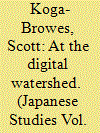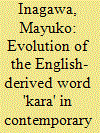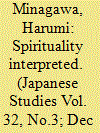|
|
|
Sort Order |
|
|
|
Items / Page
|
|
|
|
|
|
|
| Srl | Item |
| 1 |
ID:
117505


|
|
|
|
|
| Publication |
2012.
|
| Summary/Abstract |
The switch to digital terrestrial broadcasting on 24 July 2011 marked a watershed for the broadcasting industry in Japan. Digitalisation is the single largest industry-wide event since the advent of alternative distribution technologies, satellite and cable, in the 1980s. Preparation for the switch to digital, known as chideji-ka, has put existing business arrangements under pressure and has led to a renewed focus on the future shape of the industry. There is increasing acknowledgement that change, especially in the relationship between central and local broadcasters, is inevitable. This paper summarises the position of the industry at the beginning of its digital age, arguing for a new view of broadcasting in Japan that recognises the two-tier reality behind industry rhetoric. It also summarises the major options open to the industry as it looks to redefine itself in a much-changed media environment.
|
|
|
|
|
|
|
|
|
|
|
|
|
|
|
|
| 2 |
ID:
117502


|
|
|
|
|
| Publication |
2012.
|
| Summary/Abstract |
Language is not static, but is constantly changing. This study explores the linguistic evolution of one loanword in contemporary Japanese over place and time using a corpus-driven approach, with special reference to word usage and frequency. Taking the English-derived word kara, which corresponds to 'colour' in English, as an example, it aims to identify how and to what extent (a) the application and implications of kara in Japanese have diverged from its counterpart in English (i.e., over space) and (b) the frequency and usage of English-derived words in the Japanese language changed over the 15-year period between 1991 and 2006 (i.e., over time). These goals are achieved through an analysis of corpora consisting of Mainichi shimbun articles published in 1991 and 2006. The study's main argument is that both place and time are significant factors in language change and dynamic mechanisms involving both the donor and receiver languages are at work in creating culturally-specific usages of the word. The study also discusses that such change involves both linguistic and extra-linguistic factors.
|
|
|
|
|
|
|
|
|
|
|
|
|
|
|
|
| 3 |
ID:
117504


|
|
|
|
|
| Publication |
2012.
|
| Summary/Abstract |
Is the '1960s' a useful concept for understanding postwar Japanese history and, if so, what kinds of changes resulted and how might we chronologize the period? This article proposes the idea of a 'long environmental sixties' in Japan stretching from around 1959 to 1973. The article argues that this period marked important milestones in environmental protest, public opinion, and legislation. By the early 1970s Japan had addressed many of its most pressing industrial pollution problems, in the process placating protest, compensating victims, and establishing an environmental leviathan staffed by hundreds of bureaucrats nationwide. Japan's sixties were a moment of social upheaval, transformation, and new aspirations but, as this article shows, the country's long environmental sixties bequeathed a complex legacy, combining new forms of civic engagement with administrative programs and corporate initiatives to carefully manage the human-environment nexus.
|
|
|
|
|
|
|
|
|
|
|
|
|
|
|
|
| 4 |
ID:
117501


|
|
|
|
|
| Publication |
2012.
|
| Summary/Abstract |
Language education for home-background speakers or heritage learners has recently attracted significant attention in many countries. This case study reports on some of the findings on these speakers' backgrounds, profiles and language identities, utilising the data collected from a survey and focus group interview with 10 tertiary-level Japanese home-background speakers. We found that although all are classified as 'home-background speakers', they are a very heterogeneous group of students in terms of their backgrounds and language identities. This paper also discusses the implications of the findings for Japanese language education designed for this group of students, and points to the necessity of understanding the diverse needs of these students when educators are developing courses of study for them.
|
|
|
|
|
|
|
|
|
|
|
|
|
|
|
|
| 5 |
ID:
117499


|
|
|
|
|
| Publication |
2012.
|
| Summary/Abstract |
This article examines the mechanism of grammar acquisition in a second language and explores how linguistic categories can be acquired effectively. Currently, the mainstream second language teaching approach is the communicative approach. As far as the acquisition of linguistic categories is concerned, however, the communicative approach is based on a 'learning by doing' model, which assumes that learners will acquire linguistic categories through exposure to language input and interaction. Therefore, insights into how individual grammatical items should be taught are still quite limited, and thus investigation concerning effective methods of teaching linguistic categories based on second language acquisition research is sorely needed. Here, I examine two linguistic domains (tense-aspect and relative clauses) for which the acquisition process has been researched and understood to some degree both in Japanese and other languages. I will also consider how acquisition can be facilitated, in particular from a functional-cognitive linguistics perspective.
|
|
|
|
|
|
|
|
|
|
|
|
|
|
|
|
| 6 |
ID:
117503


|
|
|
|
|
| Publication |
2012.
|
| Summary/Abstract |
Lexical borrowing is associated with emerging social needs. It provides a new word for a newly introduced idea or thing, replaces a native word adding trendiness or euphemism, allows ambiguity, etc. The noun supirichuariti ('spirituality') and the adjective supirichuaru-na ('spiritual') present an intriguing case of borrowing in Japanese. Both emerged in the wider context of the 'New Spirituality' movements and culture in Japan. They began to be used in such professional fields as terminal care, psychology, and education in the 1990s. More recently the use of the word supirichuaru, in particular, has become trendy in the narrower context of a 'spiritual boom', in which it is often associated with 'spiritualism', and has come to refer to a range of interests and experiences associated with the boom. By drawing data from a wide range of discourse genres, this article elucidates the complexity of the borrowing processes. The article also argues that these Western loanwords, used in different subcultures with differing and often elusive meanings, are linguistic evidence, however ephemeral it may be, that reveals a common thread which runs through the current spiritual culture in Japan, where no native Japanese words have been able to take up the role.
|
|
|
|
|
|
|
|
|
|
|
|
|
|
|
|
| 7 |
ID:
117500


|
|
|
|
|
| Publication |
2012.
|
| Summary/Abstract |
What keeps learners of Japanese going in formal study? In Australia, few continue to an advanced level of the language, despite large numbers of learners. This study found that compared to discontinuers, continuers showed much higher levels of motivation and integrative orientation, and their attitudes towards learning were much more positive. They showed greater autonomous learning, and engaged in more self-initiated activities outside the classroom. In interviews, advanced learners explained the paths that enabled them to continue, yet indicated that university policies affect continuation through timetable and study program restrictions. The predominant reason to continue was the hope to travel to Japan, but an interest in Japanese culture and in Japanese popular culture (J-pop) products (e.g., anime, manga) also was prominent. The enjoyment of J-pop was implicated at least partially in both retention and attrition in Japanese. It provides the motivation to learn Japanese, and in a cyclical fashion, the learning of Japanese itself is consumed so as to further consume J-pop. It may also be the case that once appetites for language consumption are satisfied, some learners could abandon formal study of Japanese at a relatively early stage.
|
|
|
|
|
|
|
|
|
|
|
|
|
|
|
|
|
|
|
|
|